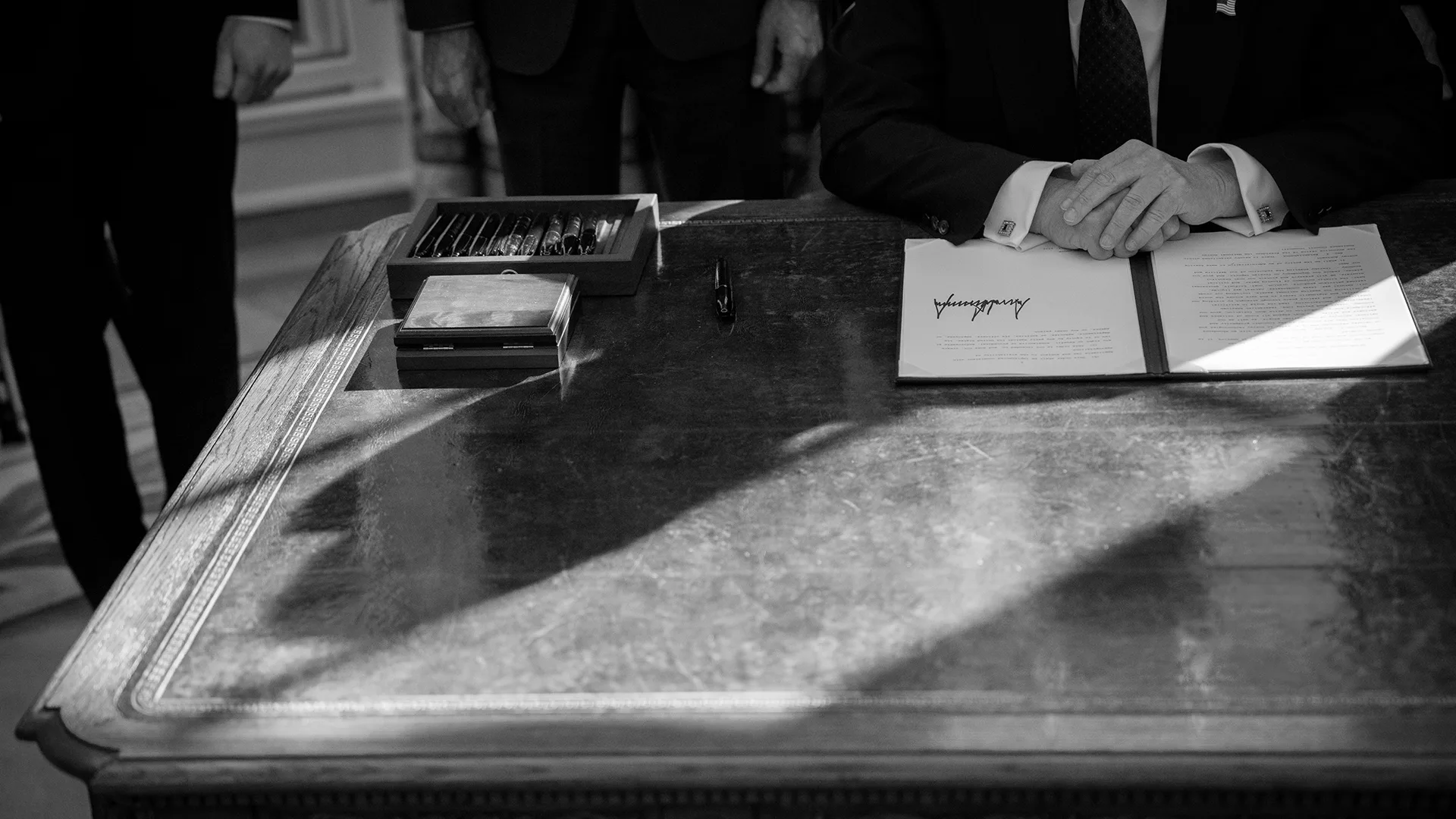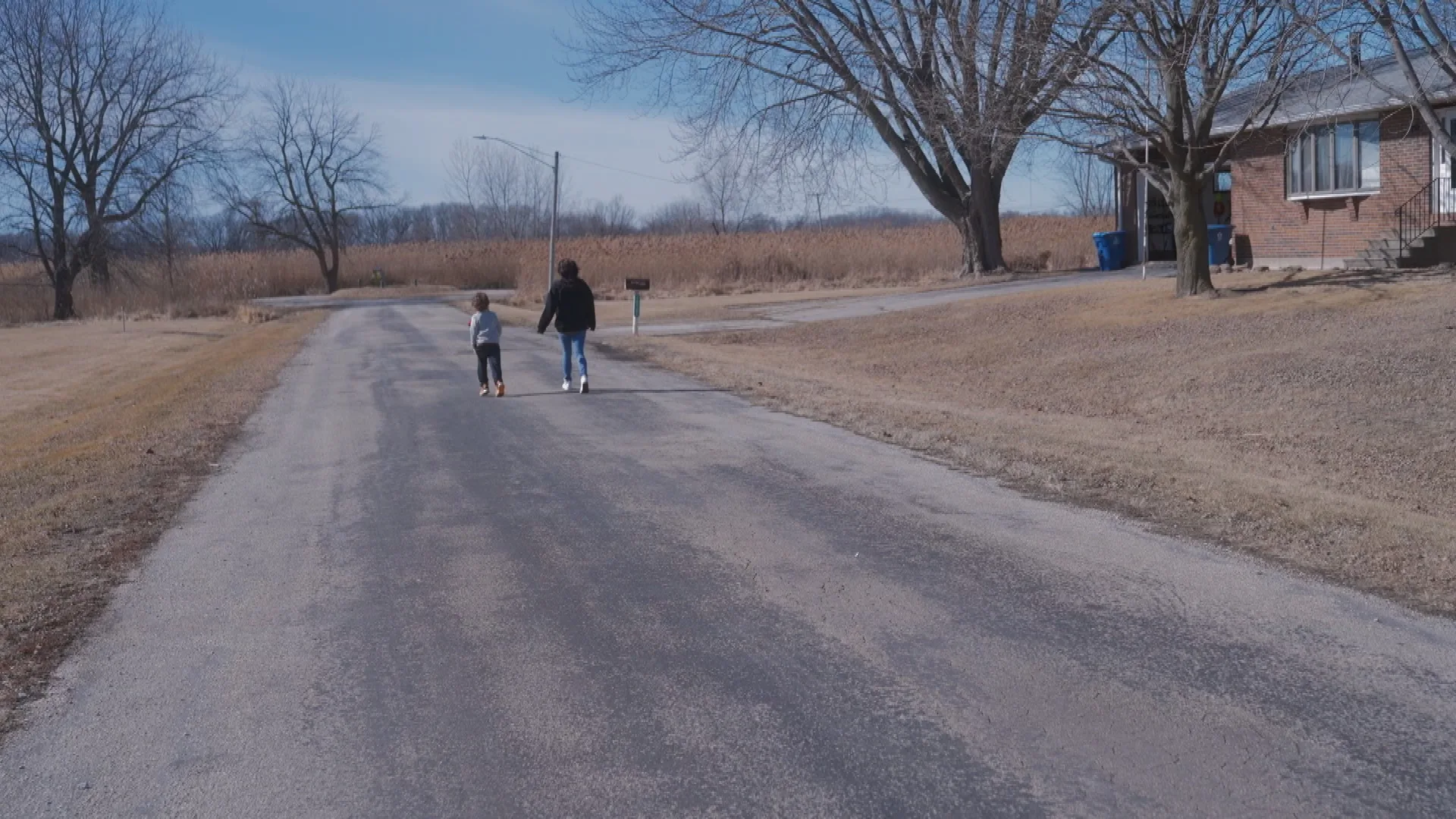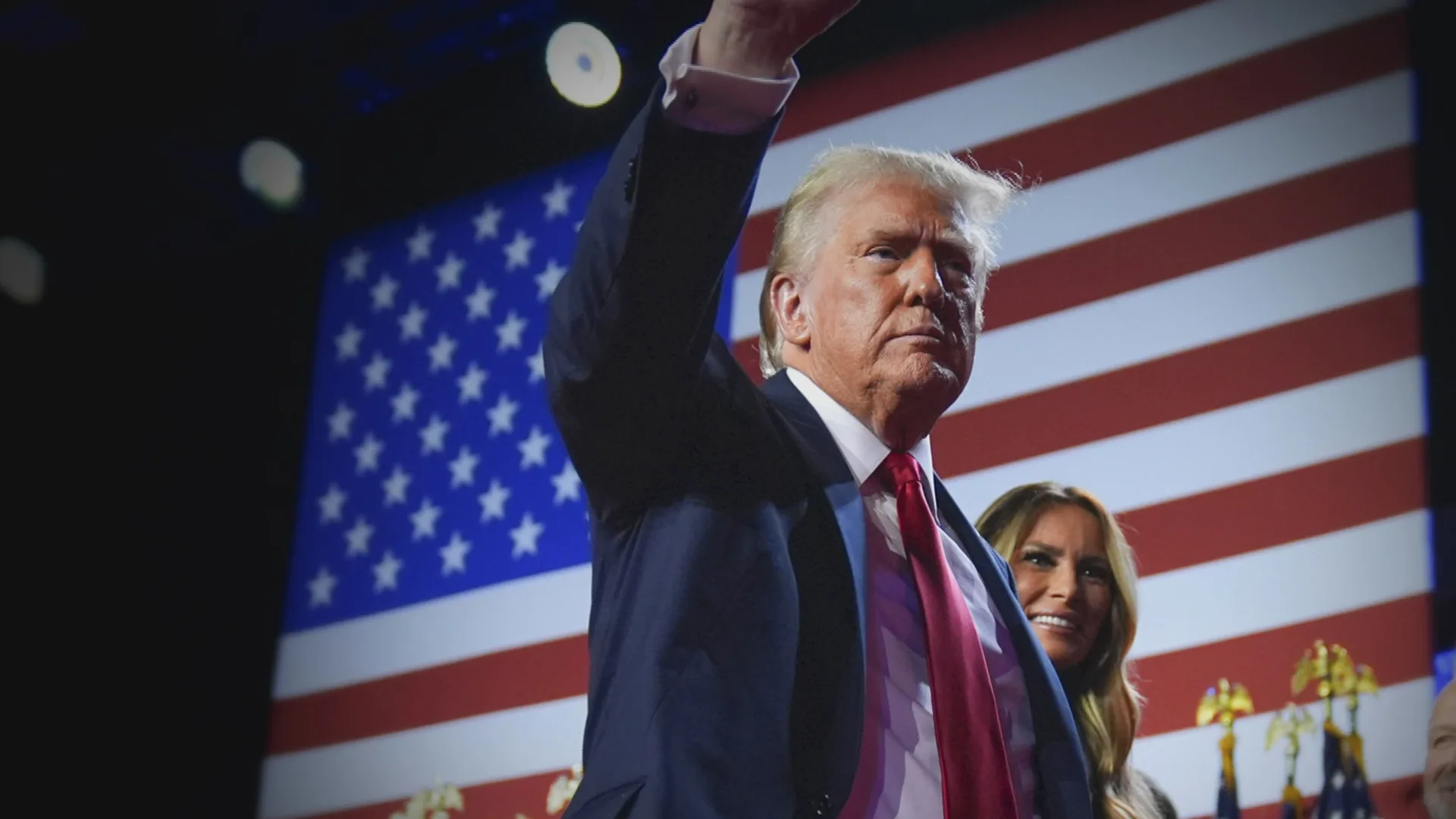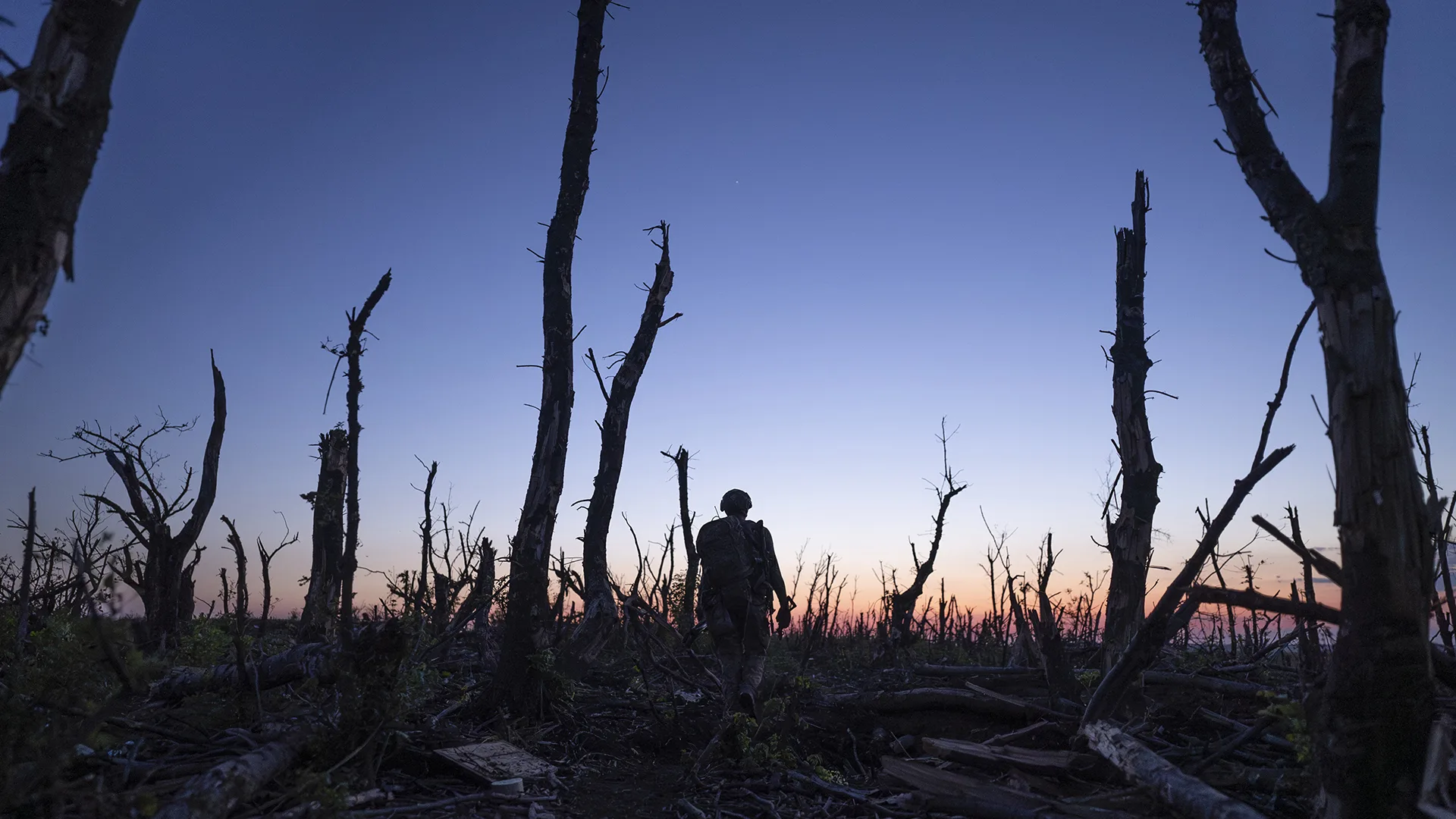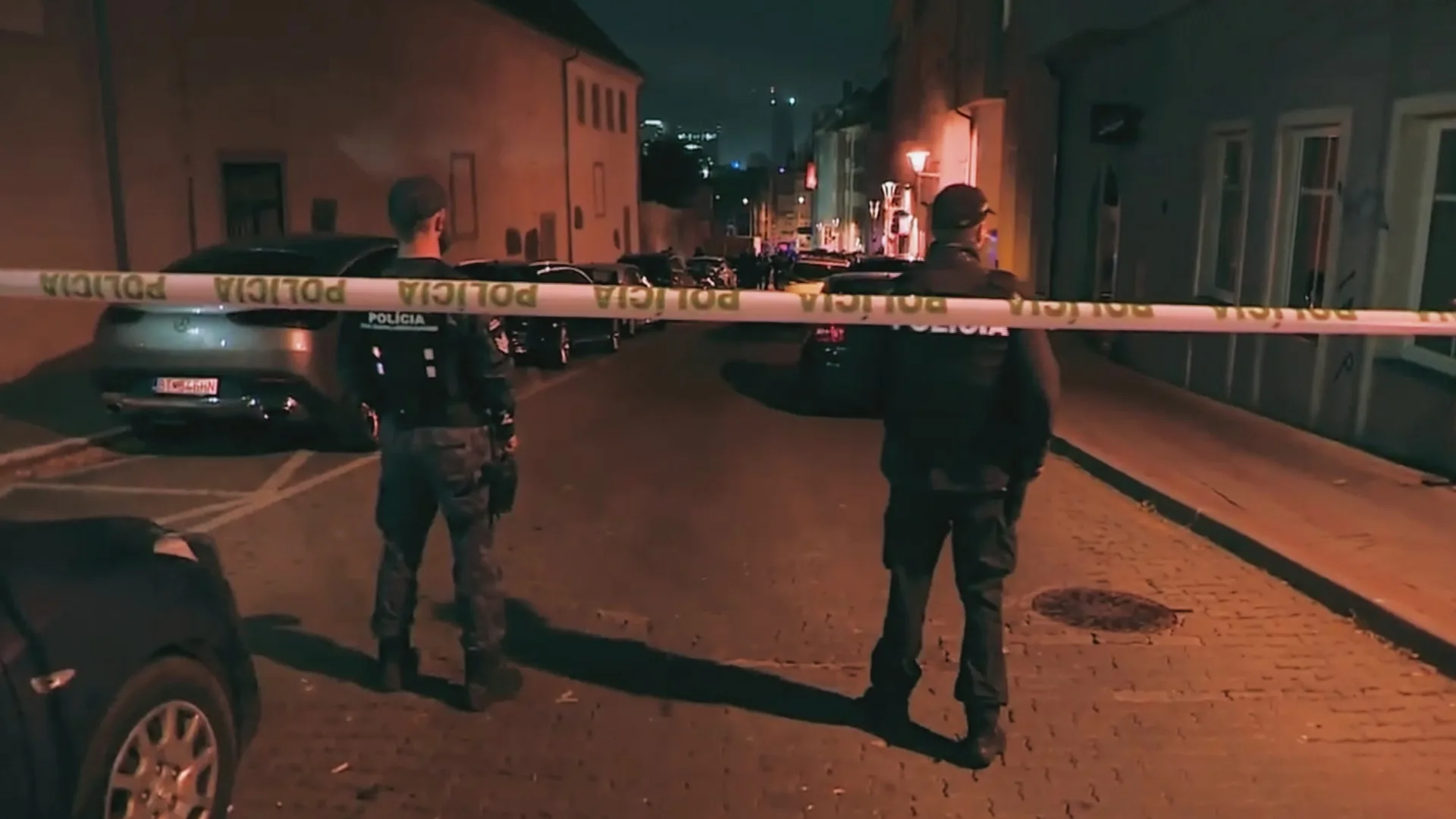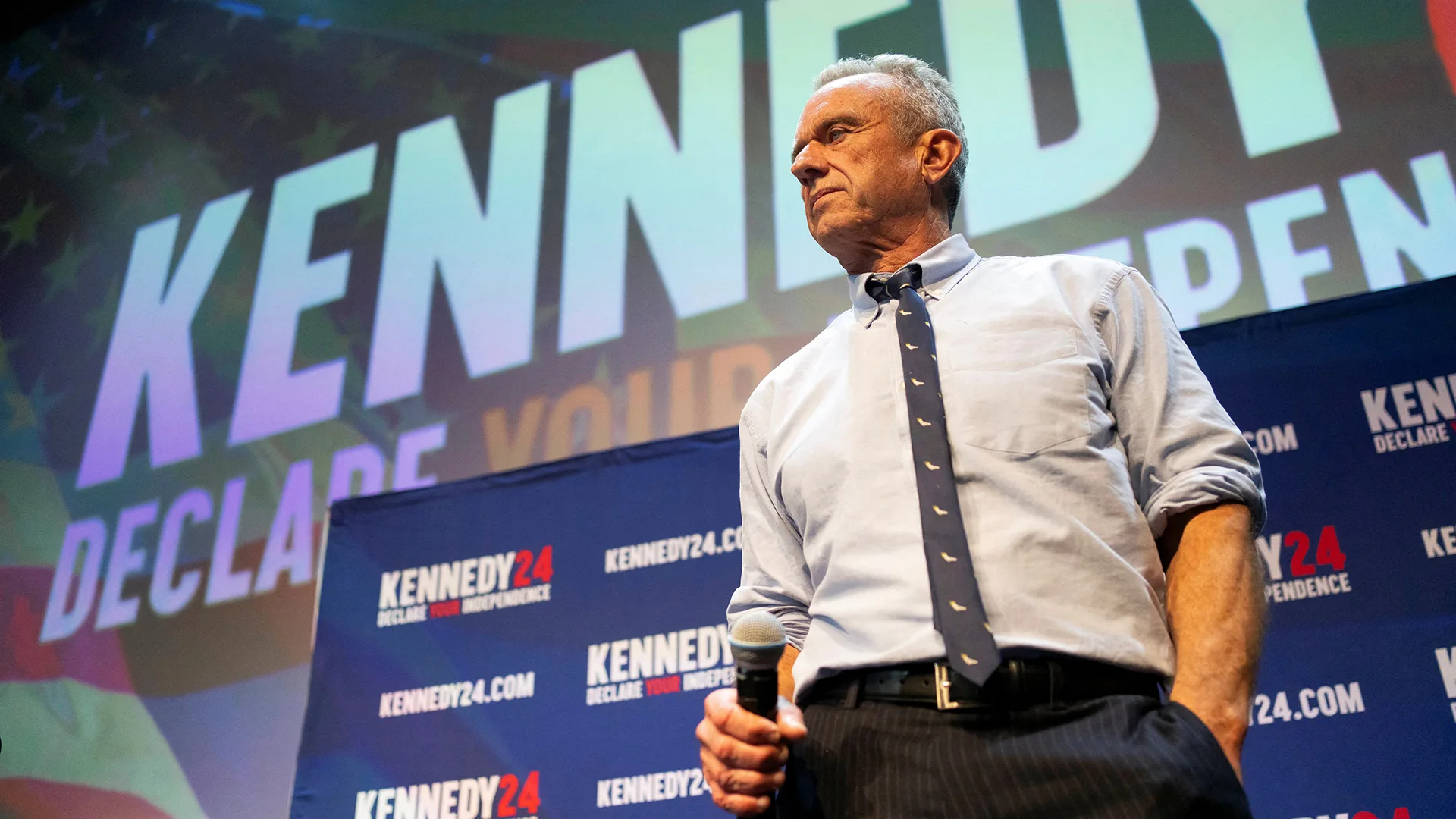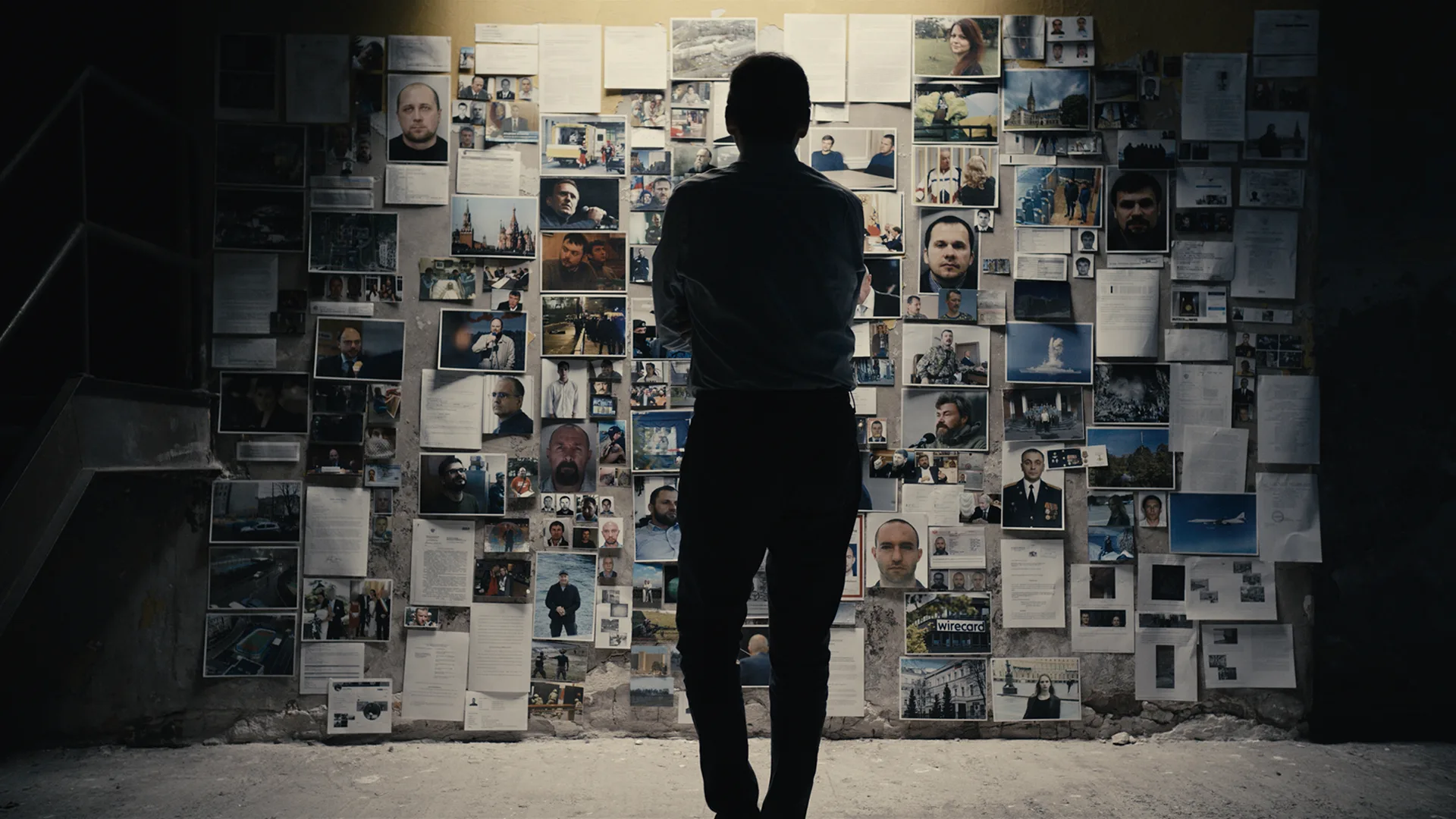The VP Choice: Vance vs. Walz
October 8, 2024
54m
FRONTLINE investigates the lives and views of Sen. JD Vance and Gov. Tim Walz as they run for vice president
The VP Choice: Vance vs. Walz
October 8, 2024
54m
Share
FRONTLINE investigates the lives and views of Sen. JD Vance and Gov. Tim Walz as they run for vice president. In a historic election, those who know the candidates best reveal the influences and ideas they would bring to the White House.
Also watch The Choice 2024: Harris vs. Trump, our critically acclaimed election-year special offering interwoven investigative biographies of both major-party candidates: Kamala Harris and Donald Trump.
Plus, read additional interviews from the making of this documentary as part of the FRONTLINE Transparency Project.
Support provided by:
Learn More
Most Watched
The FRONTLINE Newsletter
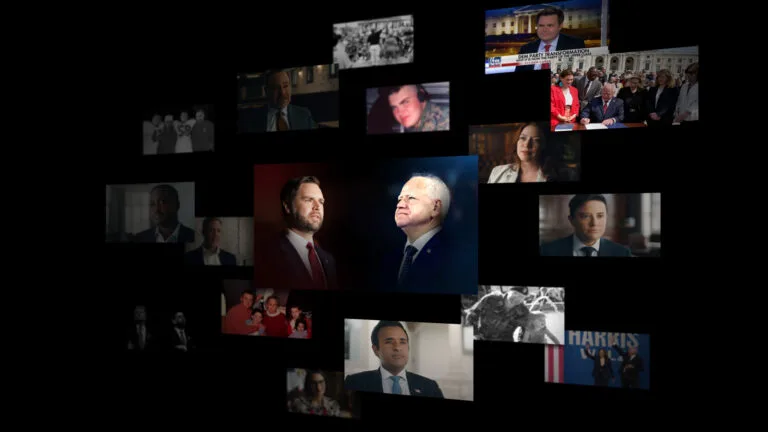
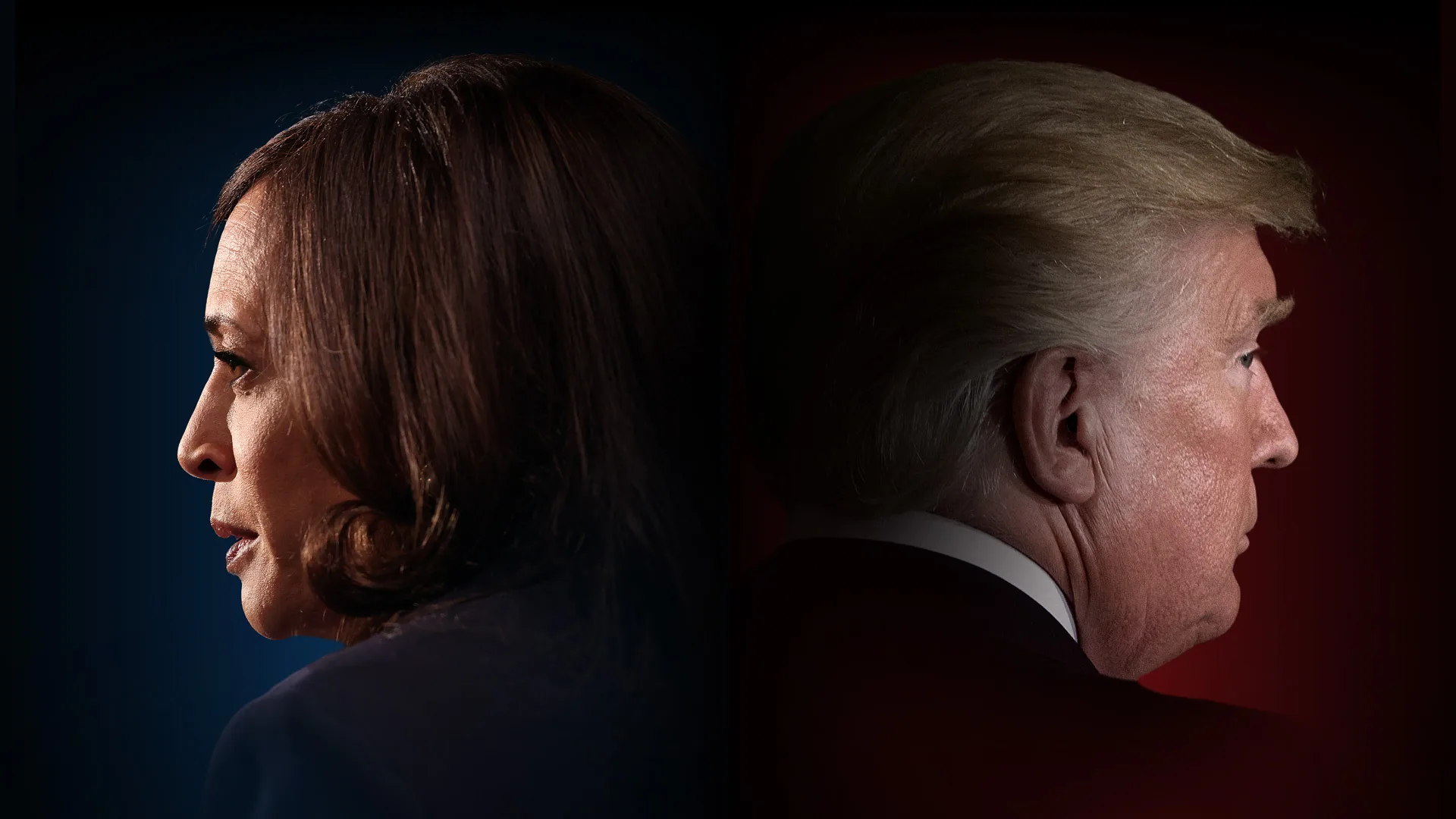
The Choice 2024: Harris vs. Trump
Related Stories
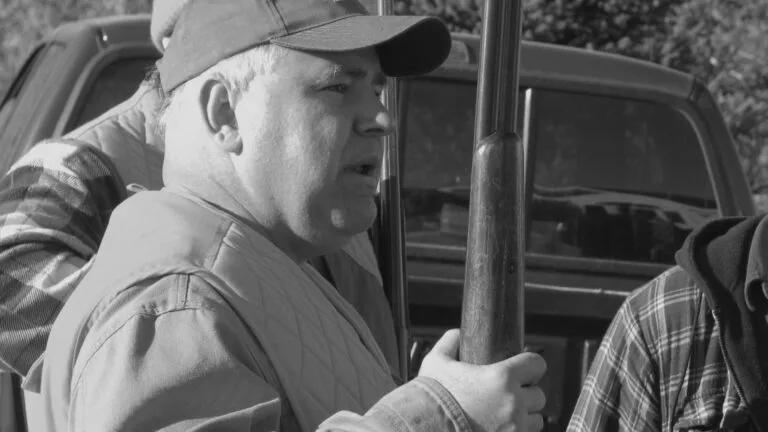
From an NRA ‘A’ Rating To Calling for Reform: How Tim Walz Shifted on Guns While Running for Governor
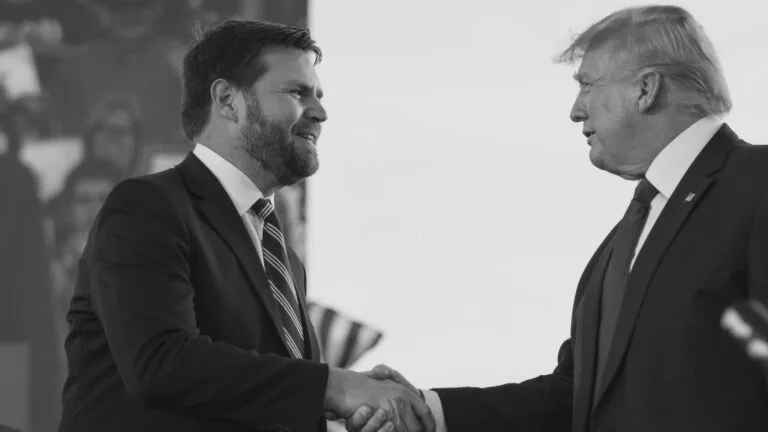
From ‘Never Trumper’ to a Trump Endorsement: How JD Vance Shifted on Trump When He Entered Politics
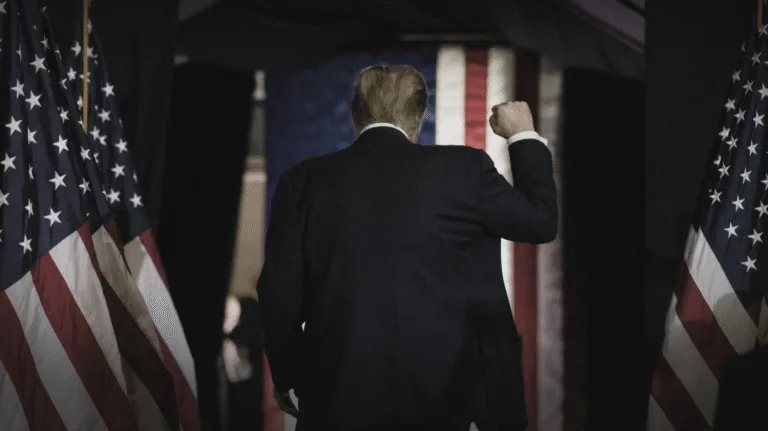
After Turbulent Election Season, Trump Defeats Harris. What Shaped This Political Moment?

The Choice 2024: Harris vs. Trump
Related Stories

From an NRA ‘A’ Rating To Calling for Reform: How Tim Walz Shifted on Guns While Running for Governor

From ‘Never Trumper’ to a Trump Endorsement: How JD Vance Shifted on Trump When He Entered Politics

After Turbulent Election Season, Trump Defeats Harris. What Shaped This Political Moment?

The Choice 2024: Harris vs. Trump
NARRATOR:
Two men vying to be second-in-command. One, a young firebrand of a new conservative movement.
JD VANCE:
From open borders to stagnating wages, the people who govern this country have failed and failed again.
NARRATOR:
The other, a governor and former congressman who championed liberal causes.
TIM WALZ:
We’ll build a country where workers come first. Health care and housing are human rights.
NARRATOR:
Both from the middle of America, but on opposite sides of the country’s political divide.
JD VANCE:
We will, in short, make America great again.
NARRATOR:
This is the story of how they found their political voices—
TIM WALZ:
I’m ready to turn the page on these guys. Say it with me: We’re not going back.
NARRATOR:
—and their unlikely paths to become vice presidential candidates.
NARRATOR:
JD Vance began to find his political voice far from his roots: the Yale Law School in New Haven, Connecticut.
DAN DRISCOLL, Yale Law classmate:
The way that you could tell that JD was so different is he didn’t seem to get sucked up in the power dynamic that exists at a place like Yale Law School. It didn’t feel like he had come from the elite boarding schools and done all of the resume-building activities that a lot of other people had. He certainly didn’t have the money.
SOFIA NELSON, Yale Law classmate:
JD and I met in the fall of 2010. He was an affable guy, friendly, and he felt, like me, out of place in the Yale Law School environment, and I think that was our initial point of connection.
NARRATOR:
As members of the class of 2013 at the prestigious law school, Vance and Sofia Nelson bonded over their upbringing in the Midwest.
SOFIA NELSON:
We had very similar backgrounds, so we didn’t do a lot of explaining. It was more kind of, “What are all these other people’s worlds like?” A curiosity or kind of a shock as to what we were surrounded by.
NARRATOR:
He became friends with another student with a shared past.
VIVEK RAMASWAMY, Yale Law classmate:
We grew up in southwest Ohio, so we got to be friends, and we used to watch Bengals games together. Not a lot, but occasionally we would go to a bar in New Haven and bonded over our Cincinnati-ness and our Ohio State fandom.
NARRATOR:
Vivek Ramaswamy would go on to become a wealthy entrepreneur and Republican presidential candidate.
VIVEK RAMASWAMY:
I think JD was much more conscious of the environment that he was in as being different from the one that necessarily he grew up in or had lived in up to that point in time. I do think that that created some tension in his own relationship with his experience at Yale. But I think the fact that he was surrounded by people who had different experiences and often different viewpoints than people like me or him was probably good.
NARRATOR:
Vance had arrived at Yale Law School after a tumultuous upbringing.
IAN WARD, Politico:
Vance grew up in this small Ohio city. It had been a steel city. It was witnessing the post-industrial decline that was happening across the Midwest. His own grandfather had worked in the steel mill. He had seen people lose jobs. This was the opioid epidemic as well, so his mother had struggled with drug addiction. His friends had struggled with drug addiction. People were dying in his town.
SIMON VAN ZUYLEN-WOOD, New York Magazine:
Vance’s mother cycled through numerous, numerous men and failed father figures in Vance’s life. You can’t separate JD Vance, who took his mom’s name, from this fatherless childhood.
NARRATOR:
Vance joined the Marines, serving in a public affairs unit, and did six months in Iraq—another reason he would stick out at Yale.
DAN DRISCOLL:
I had just finished the military, and JD ran this group called the Yale Veterans Association. So he took us out for pizza the first night before school started and basically said something along the lines of, “Hey, look, you’re going to be self-conscious. You’re going to feel like all these people are smarter than you. And it’s just not true. And so if you can just make it through these first couple of months, you’ll settle in.” And that was really powerful to me.
NARRATOR:
On campus, he was already gravitating toward politics.
SOFIA NELSON:
It was just clear that he loved politics. He loved talking about it. He loved talking about policy. He certainly was a conservative, but he was starting to question a lot of the orthodoxies of the mainstream conservative movement, particularly around the culture wars.
VIVEK RAMASWAMY:
I think JD is somebody who has harbored real frustrations about the direction of our country for a long time. I think that that boiled over a little bit during our time at Yale and some of his frustrations towards what he would call elite institutions like Yale, but I think it ran far deeper than that.
NARRATOR:
In 2011, Vance found inspiration that would shape his future: Peter Thiel, the provocative and conservative billionaire tech investor, delivered a speech on campus.
SIMON VAN ZUYLEN-WOOD:
Vance later calls it the most important moment of his time in law school, which is saying a lot—he meets his wife at law school. Thiel talked a lot about technological and intellectual stagnation in America. Vance connects it with his long-simmering fear that elite society, as represented to him by his Yale Law School classmates, or some of his professors, aren’t doing much for the vast middle of the country. Thiel’s idea of stagnation ends up melding with his own fear of Americans being left behind.
DAN DRISCOLL:
And so I can remember from that moment JD having a strong desire to get to know Peter more. I think what he saw in Peter was somebody who had created something from nothing and forged their own way.
NARRATOR:
It would all start to come together with the encouragement of one professor, the famous writer and legal scholar Amy Chua.
DAN DRISCOLL:
He was doing this paper with Amy Chua. He submitted his first draft, and I think she said something along the lines of, “That’s just not very good.” And so Amy went back to JD and said, “Write about your background. It’s really interesting and compelling, and you can make a difference with this.” And so that’s what started it. And then I think very early on, she read a first draft of that and said, “Oh, man, you’ve got to meet my agent.” And so I believe that’s the origin story.
NARRATOR:
For Tim Walz, politics was not his first career. For years he had been a high school teacher and football coach in Minnesota.
SAM BRODEY, MinnPost, 2015-19:
Tim Walz is a very well-liked, gregarious high school geography teacher and football coach from the town of Mankato, Minnesota, which is a town of about 50,000-ish people, about an hour and a half southwest of Minneapolis in this traditionally conservative area. A more liberal high school teacher.
DAN CLEMENT, Former student:
Growing up, it was rather conservative. So when a guy like Coach Walz comes in, he sticks out, right? And you can draw to that because it’s something—”This is different.”
JACOB REITAN:
He was very involved in the lives of students throughout the school. He spent the better part of a month building the sets for the school play.
NARRATOR:
Jacob Reitan got to know Walz when he was going through a difficult time at school.
JACOB REITAN:
Even though I was not out, a lot of people thought I was gay, and I got bullied as a result.
NARRATOR:
Walz helped him start a gay-straight alliance student group.
JACOB REITAN:
There was a discussion of what I was experiencing, and it was thought that Tim Walz, being the football coach, being a well-liked teacher within the school, would help create a calming aspect to not only the fact that I was gay, but that there was going to be a gay-straight alliance at the school.
NARRATOR:
Walz himself had gone to a small-town high school and grown up as the son of a school superintendent.
ERNESTO LONDOÑO, The New York Times:
Tim Walz spent his formative years in a string of small towns in Nebraska. And he’s described these as kind of like dots on the map that few people ever venture into. The kind of communities where, for instance, in his graduating class in high school, there were I think 24 people. And the way he speaks about it is that in small towns, people mind their own business and people look out for their neighbors. And that you should be respectful of other people’s choices and defer to whatever they want to do with their lives, as long as they’re not harming others.
NARRATOR:
It was a liberal-minded outlook that informed his path into politics.
MALE NEWSREADER:
Hundreds of area residents gathered in downtown Mankato to voice their opinions—
NARRATOR:
The pivotal moment came in the summer of 2004. He was a member of the National Guard, and there was a raging debate going on over the war in Iraq.
STATE SEN. NICK FRENTZ, Friend:
My memory of it is he felt President Bush and the Republican Party was on the wrong track. And of course, he’s a National Guardsman at the time, knows very well what’s at stake—lives, treasure, all of that.
NARRATOR:
Walz believed the war was going on too long and exacting too high a toll.
STATE REP. RYAN WINKLER, Friend:
I think that was felt personally by somebody like Tim Walz, because he had been in the Guard. It was affecting people in Mankato. It wasn’t something on the news overseas, it was something at home that people were experiencing, too.
NARRATOR:
Walz became a vocal supporter of Democratic Sen. John Kerry.
MALE SPEAKER:
For the good of Minnesota, America and the world, do you want George Bush to be our next president for the next four years?
BRIAN BAKST, Minnesota Public Radio:
In 2004, President Bush came to speak in Mankato, in a quarry. And there were two students who wanted to go hear the president speak.
NARRATOR:
The students were also Kerry supporters and had publicly clashed with Bush campaign representatives over getting tickets. Walz agreed to be their chaperone.
PRESIDENT GEORGE W. BUSH:
Thanks for coming.
BRIAN BAKST:
And he really he wanted to show them that you listen to the president at the time, even if you don’t agree with him.
GEORGE W. BUSH:
First I want to thank all the veterans who are here. I appreciate the example you have set for our troops today.
ERNESTO LONDOÑO:
Apparently one of the students had a campaign sticker for the Democratic rival, Sen. Kerry, on his wallet, and one of the security officials at the rally saw that and identified this group as a threat. And then a confrontation ensued, and Tim Walz describes having become really upset that he and his students couldn’t come in.
NARRATOR:
The controversy made the local news.
MANKATO HIGH SCHOOL STUDENT:
Both of us were, and as Mr. Walz was, we were simply going to see the sitting president of the United States.
MALE NEWSREADER:
They were referring to their teacher, Tim Walz. Klaber says Walz was nearly arrested, but he was allowed to watch the speech in the company of the Secret Service.
TERRY MORROW, Political Director, Walz for Governor ’17:
That concerned Tim, as he later told me. He says ,“You know, I’ve got to get involved. I feel I have to do more. I can’t just let this go, that we’re becoming divisive in a way that is not the America we know or believe in. And I think that I’ve got to step up.”
NARRATOR:
Walz set his eyes on the local congressional seat in a heavily Republican district.
ERNESTO LONDOÑO:
This was a district in which nobody expected a Democrat could win. If you look historically, I think there was only one other example in the past century in which a Democrat became competitive and won this largely rural, conservative district in southern Minnesota.
CAMP WELLSTONE PROMO VIDEO:
Camp Wellstone is about imparting and teaching politics.
NARRATOR:
His first step: a boot camp for aspiring politicians.
WOMAN IN WELLSTONE VIDEO:
Because we’re going to take back our country!
TERRY MORROW, Former political adviser:
Camp Wellstone was a wonderful opportunity. You get together with folks who were running for everything from school board to state house to federal offices. You learn all the things that you wouldn’t know in your first run.
NARRATOR:
One of Walz’s trainers was Peggy Flanagan, who had just been elected to the school board in her town.
PEGGY FLANAGAN:
Tim Walz walked into the training and he’s wearing jeans and a T-shirt and tennis shoes. And he was like, “I’m Tim Walz, and I’m a teacher from Mankato and I want to run for Congress in the 1st Congressional District.” And we were like, “As a Democrat?” And he said, “Yeah.” And we’re like, “OK. Well, come on in. Good luck.” And really at the beginning of the training, I was like, “Who’s this guy?” And by the end of the training, I was like, “Who is this guy?”
Campaign ad
TIM WALZ:
I’m not a politician, and I never planned to run for office. I’ve lived my life like most people, trying to do right by my family and my neighbors.
NARRATOR:
He came out of the boot camp a newly minted politician with a long-shot campaign.
TIM WALZ:
These stands held about 3,000 people. That’s a lot. It’s also the number of American soldiers who have died fighting in Iraq. Serving right now—
NARRATOR:
He retired from the National Guard months before his unit was deployed and doubled down on his opposition to the war.
BRIAN BAKST:
Nobody was giving him all that much credit or all that much—They weren’t really seeing him as a true threat.
TIM WALZ:
Each generation gets called—
BRIAN BAKST:
And he talks about how he mobilized people in his student community and his school community and in his neighborhood to really get out there and pound the pavement in a way that Democrats hadn’t before, and present himself as a different kind of Democrat. And some of the pundits took note late in the campaign, but by then, Tim Walz was kind of on this rise.
TIM WALZ:
Thank you all!
NARRATOR:
On election night, it paid off.
TIM WALZ:
The hopes and promise of this country have been fulfilled tonight.
NARRATOR:
He would go on to win the seat five more times.
BRIANA BIERSCHBACH, Minnesota Star Tribune:
When he was in Congress, he really focused on his district.
MALE SPEAKER:
Mr. Walz.
TIM WALZ:
Thank you.
BRIANA BIERSCHBACH:
He really honed in on agriculture, veterans issues and local projects.
MINNESOTA SPEAKER OF THE HOUSE:
Gentleman is recognized for one minute.
TIM WALZ:
Thank you, Mr. Speaker. The war in Iraq—
SAM BRODEY:
He was never somebody who was considered to be on the leadership track of anything. And he really was not somebody who staked out one end of the party or the other. He was not a progressive. He was not a Blue Dog. He was not there to become a star, was not there to make waves.
JUDY WOODRUFF:
JD Vance, welcome to the News Hour.
NARRATOR:
It was the fall of 2016.
CHARLIE ROSE:
JD Vance is here. He was raised in the Rust Belt city of Middletown, Ohio.
NARRATOR:
The paper Vance had begun at Yale was now a bestselling memoir.
JOY REID:
JD, thank you so much for being here. I read so many think pieces about your book.
NARRATOR:
And he was a fixture in the national media.
FEMALE NEWSREADER:
JD, thanks so much for being with us. That sure doesn’t look like the hills of Appalachia there behind you.
NARRATOR:
His journey from a hardscrabble childhood to the Marines to Yale had struck a chord in the midst of Donald Trump’s surprising rise.
MARSHALL KOSLOFF, The Realignment podcast:
So the book just came out at the perfect time, when people were looking to say to themselves, “What are we not getting about our country and the way people within our country look at the world we’re building here?” to really understand that.
MALE NEWSREADER:
The Clinton campaign couldn’t see white working-class voters going to Trump.
TRUMP SUPPORTERS [chanting]:
USA! USA! USA!
NARRATOR:
And on election night, 32-year-old JD Vance was called on to interpret what was happening.
GEORGE STEPHANOPOULOS:
What do they want tangibly to come out of this election?
JD VANCE:
Well, I think that tangibly what they want is fundamentally a change in direction.
SIMON VAN ZUYLEN-WOOD:
Vance became the kind of Trump whisperer, in part because a lot of readers wanted to understand the Trump phenomenon through the eyes of some of the voters that seemed to represent his base.
FEMALE REPORTER:
Can you explain why some of the poorest people in America would look at the billionaire Donald Trump and think, “Yes, he speaks for me”?
JD VANCE:
Yeah, well, let me just paint a picture of the areas where a lot of these folks live. So on the one hand you find that industrial job losses mean that it’s harder to find a good job—
IAN WARD:
And Vance positioned himself as understanding the cultural and economic angst that had driven a lot of these voters.
JD VANCE:
I do think they get a special bitterness from the expectations that they had for their own lives not materializing.
DAN DRISCOLL, Friend:
He just had the entire world saying, “Hey, you are a voice that can explain to us what this other portion of the population are thinking.”
SETH MEYERS:
This obviously wasn’t what you had in mind when you wrote this book, but now people have called you this “Trump whisperer.”
NARRATOR:
But JD Vance hadn’t been a fan of Trump.
JD VANCE:
I didn’t vote for Trump.
I’m a “Never Trump” guy.
There is definitely an element of Donald Trump’s support that has its basis in racism or xenophobia.
NARRATOR:
In private messages that went public he was even more blunt, accusing Trump of racism and comparing him to “America’s Hitler.”
IAN WARD:
The most poignant metaphor he used at one point was he called Trump a type of “cultural heroin” at the peak of the opioid epidemic. And he said Trump was offering these people the sort of bliss, the oblivion that heroin was offering people in communities that had been hollowed out by deindustrialization and globalization. That he was a sort of cheap hit that cured the pain.
JD VANCE:
There’s something about Trump’s offensiveness, something about his brashness, that is appealing to the people I write about in the book. The people who grew up like I did. And I’m not a Trump supporter, but I even feel a certain attachment and I get a little bit cheery when he says certain things on—
NARRATOR:
Some of Trump’s rhetoric echoed what Vance had been thinking about since Yale and his exposure to Peter Thiel, who had become a major Trump supporter, drawn to Trump’s disruptive brand of politics.
Thiel had also become a supporter of Vance, giving him a job in Silicon Valley and helping him make important connections.
ELIZABETH DWOSKIN, The Washington Post:
A dinner party is organized by an entrepreneur named Auren Hoffman. And Thiel attends. Marc Benioff, co-founder and CEO of Salesforce, attends. Sam Altman attends. So you can see that JD Vance was getting introduced to all these powerful people. There were multiple billionaires in that room. And what Hoffman told me was that they all walked away really impressed by Vance, even though most of them were Democrats. That he held his own in the conversation, which was all about the plight of the working class and the rise of Trump.
NARRATOR:
With his voice now amplified on the national stage, and a wealthy benefactor, Vance would take the next step.
MALE INTERVIEWER:
So you’ve moved back to Ohio, or are in the process of moving back. With what intent? Are you planning to run for office? Are you going to keep on writing? Are you—
JD VANCE:
I’m sorry, I didn’t hear that question. To the audience.
NARRATOR:
He moved back to Ohio, where he’d carve out his place in American politics.
MEGYN KELLY, The Megyn Kelly Show:
Everyone wants to know whether JD’s going to run for office.
JD VANCE:
[Laughs] Who’s everyone?
MEGYN KELLY:
Everyone.
NARRATOR:
In 2017, Megyn Kelly visited Vance at his home in Ohio to discuss his book and his political future.
MEGYN KELLY:
It was obvious that he was getting a lot of buzz and that he could potentially have a future in politics because everyone at that point was looking at him as someone who understood the working class better than anyone at that point.
MOLLY BALL, The Wall Street Journal:
He had started to make political connections with people in Ohio who were looking at this idea of being a candidate for U.S. Senate. He was doing some investing, giving a lot of speeches, getting to know people in politics. And it seems like he had his eye on that Senate seat, or on some kind of political office. Very much wanted to get involved and be in the arena in that way.
NARRATOR:
Vance had once positioned himself as a “Never Trump guy,” but now he began to build a following in a pro-Trump movement calling itself the New Right. He was featured at a prominent forum for conservatives.
Promotional video
JD VANCE:
The failure to use political power that the public has given is a choice.
NARRATOR:
And he found another important ally who would propel his rise: controversial Fox News host Tucker Carlson.
TUCKER CARLSON:
JD Vance is the author of Hillbilly Elegy, the bestselling book, and also one of the sharpest—
MOLLY BALL:
That’s where the voters are. Tucker at this point, before he lost his show, is the highest-rated host in all of cable. He’s getting millions of viewers every night, and his show is consistently an articulation of this anti-woke, New Right philosophy.
TUCKER CARLSON:
JD Vance, thanks for joining us.
MOLLY BALL:
And Vance was a regular on that show because he was so good at speaking to these ideas.
JD VANCE:
The standard Bush Republican approach of more free trade and more tax cuts for corporations, it’s not just inadequate, it’s maybe dangerous and stupid.
NARRATOR:
The show was a platform for divisive rhetoric and conspiracy theories.
TUCKER CARLSON:
“White supremacy, that’s the problem.” This is a hoax.
NARRATOR:
But that didn’t stop Vance and others from the New Right from going on the show night after night.
TUCKER CARLSON:
If the Republican Party has a future, it will be organized around the ideas you just laid out, maybe led by you. Or someone who thinks like you. I’m serious.
DAVID FRENCH, The New York Times:
The New Right was a new ideological movement that was really trying to put some coherent flesh and bones on Trumpism.
JD VANCE:
Are we for healthy communities, healthy families, or are we just going to constantly defer to corporate interests?
MOLLY BALL:
He and Tucker are both articulating in tandem this New Right philosophy. It’s about bringing back manufacturing and stopping unfettered trade. It’s anti-abortion, anti-gay rights in a lot of ways.
TUCKER CARLSON:
We elevate prostitution and pimping. We sanctify abortion. It doesn’t sound—
MOLLY BALL:
And it’s about stopping immigration.
TUCKER CARLSON:
These visas do not improve American society in any way.
MOLLY BALL:
JD Vance very much believes that liberal elites have opened the borders and flooded American communities with immigrants who do not share their culture and who are a drain on public services.
JD VANCE:
Well, the role of our elites fundamentally is to be right about some of the big issues—
TUCKER CARLSON:
[Laughs] Yes!
JD VANCE:
—to make sure we stay ahead of some of these critical questions.
MEGYN KELLY:
It became sort of back-and-forth. JD listened to Tucker. Tucker listened to JD. And they were both in line with Trump and his goals for the country.
NARRATOR:
With Carlson and the New Right, Vance’s Trump transformation continued.
IAN WARD:
There’s a debate here on how authentic Vance’s transformation was. Was it purely opportunistic?
JD VANCE:
I happen to think that we should be approaching China as we should’ve approached Nazi Germany in the early 1930s.
IAN WARD:
Was he just molding himself to the political climate and saying what he needed to say to get ahead? The other side of the debate is there’s something authentic about his transformation. I think the reality is it’s a bit of both. I think people have a way of talking themselves into the thing that is politically expedient for them. But you come to believe it, right?
NARRATOR:
Vance’s transformation also coincided with a personal conversion: At age 35 he became a Roman Catholic.
MALE INTERVIEWER:
So you were raised a non-denominational Christian. I understand you were never baptized. You’ve also said you went through an angry atheist phase.
NARRATOR:
Vance explained the conversion at a conference for Catholics.
JD VANCE:
But why did I become a Catholic? There are all these things that I could point to, but, one, I really liked that the Catholic Church was just really old. [Laughter] I felt like the modern world was constantly in flux. The things that you believed 10 years ago were no longer even acceptable to believe 10 years later.
NARRATOR:
Vance’s friend Rod Dreher was at the baptism.
ROD DREHER:
He never imagined he would become a Catholic, but he was quite serious about it. And we talked about how God would use him in the future.
Catholics in America are very deep, have a deep intellectual bench. They look out for each other. They help promote each other. They console each other. And in that world, I think JD found himself at home.
MARSHALL KOSLOFF:
During the Trump years, Catholicism, on a variety of very straightforward, really interesting levels— tradition, return to a certain style of institutionalism—really appealed to members of the right. So you will notice on the New Right, especially, there’s a disproportionate representation of Catholics, and especially Catholic converts.
NARRATOR:
The day after Donald Trump’s inauguration in 2017: a large demonstration at the Capitol protesting the new president.
MALE NEWSREADER:
One of the largest single-day protests in American history, speaking out against Donald Trump, just one day after he took office.
NARRATOR:
In the crowd was Congressman Tim Walz.
SAM BRODEY:
I remember running into him in this huge crowd right outside of the House office buildings, and he kind of just shows up to check it out. I think he just wanted to understand where his party was at this critical moment. The Trump election was a moment of immediate realignment. And I remember him being reflective in that moment and sort of going, “What exactly happened here?” I think about the fact that not too long after he was at that women’s march he launched his campaign for governor.
TIM WALZ:
We’re going to file some paperwork and we’ll be right back out.
BRIAN BAKST:
He decided that the states were going to take a lead role in repelling some of the ideas that Trump was pursuing.
TIM WALZ:
Here we go.
BRIAN BAKST:
And that was one of the points that really led him to think that “Maybe I’ll have more impact if I go back home and run for governor.” And he started to really build up toward that campaign.
2018 campaign ad
TIM WALZ:
Donald Trump has betrayed our values, but the fight back starts here, and I’ve never been one to just stand on the sideline.
NARRATOR:
For a decade, Tim Walz had survived politically as a moderate.
TIM WALZ:
The spirit of progressive Minnesota is alive and well.
NARRATOR:
But now, to win a Democratic primary, he would need to move to the left. He had a major problem: guns.
2012 radio ad
TIM WALZ:
I’m Tim Walz. I’m proud to stand with the NRA to protect the rights of sportsmen and gun owners.
BRIANA BIERSCHBACH:
When he was in Congress, his constituency really supported the Second Amendment. There were a lot of hunters and fishermen and -women in his district, and he was one of them himself.
2012 radio ad
MALE SPEAKER:
Tim stood up time and time again for the Constitutional rights of law-abiding gun owners and sportsmen. It’s why the NRA gave Tim an A-rating.
SAM BRODEY:
Throughout his time in Congress, he had taken liberal votes. He had taken moderate votes. But he had an A-rating from the NRA the entire time.
MALE NEWSREADER:
Breaking news tonight: the deadliest mass shooting in modern American history.
NARRATOR:
In the midst of the campaign, the gun issue kept forcing its way into the news. First in Las Vegas, and then in Parkland.
MALE NEWSREADER:
—confirming that they are responding to an active shooter at Marjory Stoneman Douglas High School in Parkland, Florida.
SAM BRODEY:
Guns become a core issue for the Democratic coalition. Anyone with an A-rating from the NRA is considered to have a scarlet letter.
NARRATOR:
Walz was under pressure politically and personally, especially from his teenage daughter, Hope.
NICK FRENTZ:
He was proud of his marksmanship and he believed in the Second Amendment. What changed is two things. First of all, the people that he represented started to change—far more voices asking for restrictions on guns, restrictions on Second Amendment rights. And then I think the school shootings struck a note. I remember the story that Hope had come home from school after a school shooting, and she was very unhappy, and they have a tremendous relationship. And so I think those two things combined to cause Tim Walz to say, “I think I need to go a different direction.”
MALE NEWSREADER:
On Facebook, Walz says that after listening to voices across Minnesota, he is now supporting a statewide ban on assault weapons.
FEMALE NEWS ANCHOR:
What’s been the response to your shift in this area?
TIM WALZ:
Well, I think it’s come over time—
NARRATOR:
On the local news, Walz was pressed to defend his new position.
TIM WALZ:
These are things that don’t infringe upon people’s rights to keep and bear arms in a manner that allows them to do what they need to do, but it does bring another measure of potentially—and I am not naive—potentially stopping one of these shootings.
SAM BRODEY:
It was an argument that landed for people at the time. And I think Democrats were ready to accept his explanation.
TIM WALZ:
Give me the opportunity to earn your endorsement. We will make these things happen in Minnesota and make sure—
SAM BRODEY:
And it speaks to his skill. I think it was a pretty masterful evolution as they go.
NARRATOR:
It would work: He’d become governor—
TIM WALZ:
Our democracy is strong tonight, thank you!
NARRATOR:
—but it wouldn’t be long before an even greater political test.
MALE SPEAKER:
You’re seeing how they just didn’t care about this man.
NARRATOR:
The protests that erupted in Minneapolis over the police killing of George Floyd.
FEMALE NEWSREADER:
A bystander’s video shows a white officer pressing his knee on the man’s neck.
KEITH ELLISON, Minnesota attorney general:
Early that morning I was on the phone with the governor saying, “Man, what are we going to do?” And he, first of all, had a very human reaction, saying, “My goodness, what a—I feel so bad for that man’s family, to see their loved one killed like that on video.” He had a human reaction.
PROTESTERS [chanting]:
George Floyd! Say his name! George Floyd! Say his name! George Floyd!
NARRATOR:
Walz put out a statement, saying, “The lack of humanity in this disturbing video is sickening. We will get answers and seek justice.”
Ryan Winkler, a political ally in the state Legislature, was in close touch with him.
RYAN WINKLER:
We’re on Zoom calls, and as legislators, we’re trying to feed him information that we’re hearing from people on the ground and concerns that we have.
PROTESTERS [chanting]:
I can’t breathe! I can’t breathe!
RYAN WINKLER:
It’s important to remember that George Floyd is murdered in the middle of the pandemic—not even long after it had started. People were locked down in their homes when this murder happened, and when the reaction to it started, everyone expected there would be protests. But how that would evolve and develop in the middle of a pandemic was not at all predictable.
MALE NEWSREADER:
Chaos in Minneapolis.
NARRATOR:
After peaceful protests turned into violent unrest, the governor faced a critical decision—one that would be heavily scrutinized for years to come.
BRIANA BIERSCHBACH:
Things escalated pretty much right away. Riots broke out. Big swaths of the city were destroyed. And Walz is, as governor, the head of the National Guard. And so the conversation became can Minneapolis handle this on its own with their police force and their firefighters, or does the National Guard need to be called in?
PROTESTERS [chanting]:
No justice, no peace! No justice, no peace!
RYAN WINKLER:
He was feeling this kind of real, direct, gut-wrenching sense of, “I’ve got to make a call here. There’s probably not a good answer, and I’m going to do my best.” It was not clear to anyone what was going to happen next, and it was never clear, except in hindsight, that it was going to be necessary for the National Guard to basically lock down large portions of the city.
NATIONAL GUARD MEMBER [over loudspeaker]:
If you do not disperse and stop all violent, disruptive behavior, you will be arrested.
NARRATOR:
After nearly two days of violence, Walz called up a limited force to help the Minneapolis police. He took pains to explain the decision to the Black community.
TIM WALZ:
Good morning, everyone. This has obviously been the most difficult week in Minnesota, in recent history and maybe in our entire history.
BRIAN BAKST:
Tim Walz is trying to figure out, well, how do I both show support for the folks who are out there putting themselves in danger, to try to solve the situation—
TIM WALZ:
I understand clearly there is no trust in many of our communities.
BRIAN BAKST:
—but at the same time, show empathy to people who haven’t had great interactions with the police over the years in these communities?
TIM WALZ:
And I will not patronize you, as a white man, without living those lived experiences, of how very difficult that is. But I’m asking you to help us. Help us use humane way to get the streets to a place where we can restore the justice so that those that are expressing rage and anger and demanding justice are heard.
BRIAN BAKST:
And he said, “Look, I haven’t lived this life in your shoes. I’m trying to come at it from the perspective of I’m just trying to listen to you and figure out what do you need, and how does that fit with what the broader community needs in terms of public safety?”
MALE PROTESTER:
You ain’t never going to tell your son about this day. I don’t got no choice.
NARRATOR:
But the deployment wasn’t enough for some of Walz’s critics, who wanted him to do more.
STATE SEN. PAUL GAZELKA, (R) Majority leader, 2017-21:
When I started publicly going after him, doing press conferences, because it was like, you’re not moving. You’re frozen. Why are you not acting? And we had a few texts in that time, just because—on Friday night I said, “Governor, where are you?”
FEMALE REPORTER:
The police have been moving slowly forward, trying to—
NARRATOR:
Walz would soon have to double down and mobilize the largest domestic National Guard deployment in Minnesota history to restore order.
PAUL GAZELKA:
Every business for miles was just destroyed. So I was just like, I can’t believe this is Minneapolis. And it didn’t have to be.
ERNESTO LONDOÑO:
There’s been a lot of debate about whether had he acted sooner, and had he been more decisive in sending the National Guard to try to quell the unrest, whether some of the destruction that ended up costing hundreds of millions of dollars could have been prevented. Whether he waited too long and hesitated. And it’s a question that has come back to haunt him now that he’s on a bigger political stage.
NARRATOR:
By 2021, JD Vance was finally ready to make a run.
JD VANCE:
—and that’s why I’m running to be your next U.S. senator for the state of Ohio.
MOLLY BALL:
By the time Vance runs for Senate, it was very clear how he thought he could reach the Republican base voters that he was going to need to win this primary.
JD VANCE:
Your concerns about your own country don’t matter because you’re a racist. That’s why you want the southern border secure, is because you’re a racist. That’s what they tell people.
TUCKER CARLSON:
He joins us tonight. JD Vance, thanks so much for coming on.
NARRATOR:
On Tucker Carlson’s show, he’d make increasingly provocative comments.
JD VANCE:
We are effectively run in this country, via the Democrats, via our corporate oligarchs, by a bunch of childless cat ladies.
DAVID FRENCH:
You cannot be a part of MAGA, you cannot be a part of the New Right if you’re not an aggressive, pugilistic figure. If you’re not a provocative figure. It’s just mandatory. And so if you’re going to dive into Trumpism, you’re diving into the pugilism. You’re diving into the aggression.
JD VANCE:
[Laughs] I mean, transgender people waving the rainbow flag with 6 year olds gyrating in a parade, in downtown New York City. Which actually happened.
NARRATOR:
Some of those who knew Vance at Yale were alarmed by what they were seeing and hearing. His relationship with his friend Sofia Nelson would rupture in a text thread over transgender issues.
SOFIA NELSON:
I told him that directly that the man you’re becoming and the voice you’re becoming is so far from the person that I knew, and I’m really sad by that and I think you’re starting to harm real people. And his response was, “I will always love you, but I really think the left’s cultural progressivism is making it difficult for normal people to live their lives.”
We disagreed all the time, but there was never name-calling. There was never this mean-spirited cruelty. And so to see that tone happen—which I think it’s both the substance and the tone that are important to acknowledge, right? Because, yes, we evolve on issues, but do we devolve in the way we talk about people? I’ve changed my mind on a lot of issues, but I haven’t suddenly started being mean.
NARRATOR:
Out on the campaign trail, Vance had the financial support of Peter Thiel and was moving closer to getting the key endorsement he needed from the man he’d once compared to Hitler.
MOLLY BALL:
In 2021, Peter Thiel takes him to Mar-a-Lago to meet Donald Trump for the first time. And Trump is very well aware of all the nasty things that Vance has said about him in the past. So he knows he needs to make nice with Trump in some way.
NARRATOR:
Also at the meeting was another future ally: Donald Trump Jr.
DAN DRISCOLL:
Donald Trump Jr. and JD have become great friends. From what I’ve seen, they do text near daily. They talk about their friends, and they talk about their kids, and they talk about political issues. And when JD was needing President Trump’s endorsement, or wanting his endorsement, I have no doubt that Donald Trump Jr. was pushing on his behalf.
MOLLY BALL:
He wants to convince Donald Trump that he’s his own man, but also that he’s a true believer. That he’s come around to these positions that Trump speaks for, and that that’s the reason that Trump should support him.
2022 campaign ad
JD VANCE:
Are you a racist? Do you hate Mexicans? The media calls us racist for wanting to build Trump’s wall. They censor us, but it doesn’t change the truth. Joe Biden’s open border is killing Ohioans.
MOLLY BALL:
His campaign ad was also very much about laying down a marker about what kind of candidate he was. On the screen, it says, “JD Vance, America First Conservative.” So he’s positioning himself as a Trumpist, as part of the movement.
NARRATOR:
It worked.
DONALD TRUMP:
You know what, he’s a guy that said some bad s— about me. [Laughter] He did. Come on up, JD.
JD VANCE:
Now, the president is right. I wasn’t always nice, but the simple fact is he’s the best president of my lifetime, and he revealed the corruption in this country like nobody else.
NARRATOR:
Vance won the primary.
JD VANCE:
Now this campaign I really think was a referendum on what kind of a Republican Party we want and what kind of a country we want.
NARRATOR:
He would go on to win the general election and immediately started making waves in the Senate.
FEMALE NEWSREADER:
Harris swore in 35 newly and reelected senators as president of the Senate. She administered the oath of office—
MALE NEWSREADER:
JD Vance, who was hand-picked by former President Donald Trump, took his seat—
FEMALE NEWSREADER:
He’s already had conversations with his colleagues on both sides of the aisle.
MOLLY BALL:
JD Vance really did not waste any time coming in as a freshman senator. He didn’t spend any time going along to get along. He immediately started looking for ways to make an impact in a different way than a typical Republican.
NARRATOR:
He found it on an issue Trump had been vocal about: U.S. support of the Ukrainian war effort.
JD VANCE:
This is not a good package. We should vote it down.
IAN WARD:
When he entered the Senate, he was one of maybe a handful of Republicans who publicly opposed U.S. aid.
JD VANCE:
We stood up and actually made the argument that it had nothing to do with the American government.
STEVE BANNON:
McConnell was—That happened at a lunch. McConnell was shocked. Tell us—
IAN WARD:
I think he sees Ukraine as Iraq 2.0 in some respects, another instance where the U.S. is driven by ideology or hubris to intervene in a conflict that it doesn’t actually have anything to do with.
MOLLY BALL:
You can certainly see Vance as a young senator seeking to become in some ways the most Trumpy senator.
NARRATOR:
Vance took on issues popular with the MAGA base: proposals to prohibit gender-affirming care for minors, limit health care for undocumented immigrants, ban mask mandates.
JD VANCE:
It’s not just that masks, according to randomized controlled studies, do no good. It’s that they can actively cause harm.
DAVID FRENCH:
You have this small cohort, and one of the things that they do is they do write and and put forward what you might call messaging bills. This is what a MAGA governing project would look like. So you’ll have the kinds of legislative activity that isn’t productive in the sense that it has any chance of becoming law, but it’s informative in the sense that it tells you what they want to do if they attain power.
NARRATOR:
Vance also aligned himself with figures like Kevin Roberts, a leading proponent of Project 2025—a 900-page plan to fundamentally remake the federal government.
Fox News report
FEMALE NEWSREADER:
The 920-page plan would gut federal climate programs. Big cuts to corporate taxes and income tax for America’s highest earners.
MALE NEWSREADER:
—reversing the FDA’s approval of the chemical abortion drug mifepristone—
MALE TALK SHOW GUEST:
—mass deportations, hard line on immigration, dismantling DHS.
NARRATOR:
It echoed some of Vance’s own ideas.
JD VANCE:
I think what Trump should do, if I was giving him one piece of advice, fire every single mid-level bureaucrat, every civil servant in the administrative state, replace them with our people, and when the courts—
NARRATOR:
But more recently, Vance has tried to distance himself from the plan.
JD VANCE:
This is the craziest fear tactic that they’re using right now. I think most Americans couldn’t care less about Project 2025. I’ve reviewed a lot of it. There’s some good ideas in there, Rob. There’s some things that I disagree with. But most importantly—
IAN WARD:
Vance sees things he likes in it, I think. Whether he would endorse the whole thing, whole cloth, I would be very doubtful of that. But he’s friends with Kevin Roberts. Kevin Roberts is one of his political confidants.
NARRATOR:
In the summer of 2024, with Donald Trump weighing who to pick as his running mate, JD Vance had the edge.
ELIZABETH DWOSKIN:
Trump is starting to make a decision about who he’s going to pick for his vice president. He’s talking to everybody. But the people who were the most forceful advocates for Vance was the Silicon Valley network. And we’re talking about Peter Thiel, Elon Musk. People have told me that Elon Musk was one of the people who was pushing hardest, actually, to pick JD Vance.
CROWD [chanting]:
JD! JD! JD!
FEMALE CONVENTION ANNOUNCER:
Ladies and gentlemen, I am proud to announce that Sen. JD Vance has the overwhelming support of this convention to be the next vice president of the United States.
NARRATOR:
After less than two years in the Senate, he was now not just a new conservative firebrand, he was the flag-bearer and number two in the MAGA movement, right next to Donald Trump.
MOLLY BALL:
Vance was a way of saying when Trump gets to the White House again, he’s going to have backup. He’s not going to have a vice president who undercuts him or brings a different point of view. He’s going to have a vice president who’s 100% on board or who even maybe wants to go further.
RACHEL MADDOW:
At this hour, NBC News can project a winner, that the Democratic incumbent Tim Walz has been reelected in the Minnesota governor’s race.
NARRATOR:
In 2022, with COVID and the George Floyd protests behind him, Tim Walz would have a sudden chance to remake his political profile.
TIM WALZ:
Minnesotans made a conscious choice tonight to choose a positive future. Democracy is live and well in this state. Well done.
MALE NEWSREADER:
Anything’s possible come January after voters gave them a trifecta: full control at the state Capitol.
FEMALE NEWSREADER:
The wish list is long, from marijuana legalization—
BRIANA BIERSCHBACH:
Suddenly he went from having divided government that he had been working with for four years to having, narrowly, but complete control of government from the legislative side and his office’s side for Democrats.
FEMALE NEWSREADER:
Democrats will now control both the state House and the state Senate for the first time since 2014.
TIM WALZ:
Let’s make it happen. Let’s go, Minnesota!
BRIANA BIERSCHBACH:
They stunned everyone and managed to say, “Hey, this is a moment that we have right now. We may not have it again, given the way the world is and how polarized things are.” And they wrote an actual list of progressive priorities.
NARRATOR:
Peggy Flanagan, his one-time political trainer, was his lieutenant governor.
PEGGY FLANAGAN:
We literally told people what we were going to do once we won, and we had a trifecta. We just did the damn thing.
MALE NEWSREADER:
The state enacted an avalanche of progressive legislation last session, expanding education funding, restoring voting rights to ex-felons, expanding Medicaid.
BRIANA BIERSCHBACH:
He very gleefully signed abortion protections.
FEMALE NEWSREADER:
A bill strengthening abortion rights in Minnesota is now officially law. Gov. Walz signed that bill today—
FEMALE NEWSREADER:
Undocumented immigrants will soon be able to get their own driver’s license legally in Minnesota.
FEMALE NEWSREADER:
All Minnesota school kids will soon receive free breakfast and lunch.
TIM WALZ:
It is now law.
BRIANA BIERSCHBACH:
He signed stricter gun control measures, particularly universal background checks.
FEMALE NEWSREADER:
—for private transfers of pistols and semi-automatic military-style assault weapons.
TIM WALZ:
There you go.
FEMALE NEWSREADER:
That was the official moment when Gov. Tim Walz signed recreational marijuana into law.
BRIANA BIERSCHBACH:
He even signed a bill to make Minnesota a refuge for transgender individuals and families.
FEMALE NEWSREADER:
So with the governor’s signature, it immediately made Minnesota a “trans refuge” state.
PAUL GAZELKA:
And so he morphed into what I say is a far-left liberal. And his policies that he passed would clearly show that. He tried to do those when I was the majority leader in the Senate, I just stopped him. And once he had total power, you got to see where he was trying to go.
ERNESTO LONDOÑO:
So I think there’s definitely a view in the capital that Tim Walz, when he had absolute power, veered sharply to the left.
BRIAN BAKST:
He wanted to contrast it with what was happening in some of these Republican states, where Republicans had the keys to everything.
TIM WALZ:
They’re banning books in their schools. We’re banishing hunger from ours.
BRIAN BAKST:
I just remember him putting this Little Free Library in the lobby of the governor’s office, and it was there because he was going to put all the books that were being banned in other parts of the country in there to make the case that the other side was wrong.
NARRATOR:
Walz leaned in to the attention, especially from the right.
MALE NEWSREADER:
This is one of the most progressive paid time-off bills in the country, and small business owners in Minnesota say could completely wipe them out.
MALE VOICE:
You come here illegally, and then you get free education. Why are Minnesota Democrats doing this?
FEMALE TALK SHOW GUEST:
And future generations will look back at what this legislature did in horror.
SAM BRODEY:
He started to really turn his gaze and train his fire on Republican governors in other states. Because he is subtweeting Ron DeSantis, clearly going after Republican governors who are pushing these policies and positioning himself as the opposite. And I do think it got him noticed by a lot of people. Because after that legislative session, you had national folks going, “Minnesota? Tim Walz? Who is this guy? Look at all this stuff they did.”
Promotional video
TIM WALZ:
Good One Minnesota morning!
BRIANA BIERSCHBACH:
There was a very ceremonial bill signing at the end of session that famously, at least in Minnesota, featured a very loud drone that flew over and through the Capitol as Walz and legislative leaders walk down the steps.
MALE NEWSREADER:
For Gov. Walz, a victory lap with DFL lawmakers. Laws by a campaign drone—
BRIANA BIERSCHBACH:
You have a marching band, and lots of people who were supporters of this agenda. They’re cheering it on. So it’s this scene where you can see not only do they understand the significance of this moment, but they’re there videotaping it with a drone And so you have to think someone who’s ready to make a video like that is maybe thinking how a video like that could be potentially used one day.
TIM WALZ:
It’s not about banking political capital for the next election. It’s about burning political capital to improve lives.
FEMALE NEWSREADER:
Former President Barack Obama recently tweeted to his 132 million followers, “If you need a reminder that elections have consequences, check out what’s happening in Minnesota.”
SAM BRODEY:
As somebody who had watched Tim Walz for a while, I’m going, “OK, I think this is somebody who maybe has his eye set on a bigger job.”
MALE DEBATE HOST:
Gentlemen, thanks so much for being here. Let’s begin the debate, and let’s start with—
NARRATOR:
That moment would come with a dramatic turn of events.
PRESIDENT JOE BIDEN:
—billion dollars, I should say, in a 10-year period.
NARRATOR:
Less than four months before the 2024 presidential election.
JOE BIDEN:
I’ve decided the best way forward is to pass the torch to a new generation.
FEMALE NEWSREADER:
—said he would pave the way for a different Democratic candidate to face—
FEMALE NEWSREADER:
—he announced his endorsement of his vice president, Kamala Harris.
NARRATOR:
As the Democrats coalesced around Kamala Harris and potential vice presidential contenders began to emerge, Tim Walz went on television and catapulted to the front of the line with one word: weird.
TIM WALZ:
These guys are just weird. That’s who they are. [Laughter]
I see Donald Trump talking about the wonderful Hannibal Lecter, or whatever weird thing he’s on tonight.
That is weird behavior.
Weird. There’s nothing—That guy’s central casting of a Bond villain. They come across weird. They seem obsessed with this. Yeah, they’re weird.
SAM BRODEY:
He was always fiery, I will say. He was always passionate, fired up. But attacking, throwing elbows was not what he was known for doing best. Certainly coming up with the attack line that was going to be parroted by the entire Democratic Party. That was a moment where I was like, “OK, this is actually a slightly different politician than the one I know.”
MALE NEWSREADER:
Vice President Harris appearing in Philadelphia tonight with her just-announced running mate, Minnesota Gov. Tim Walz.
NARRATOR:
Nearly 20 years since walking into a boot camp for political novices and a long-shot bid for Congress, Tim Walz made his debut on the presidential ticket—his party’s choice to be second-in-command.
TIM WALZ:
That’s how we make America a place where no child is left hungry, where no community is left behind.
ERNESTO LONDOÑO:
When you look at the choice of Tim Walz versus JD Vance, you see two people who claim to understand and speak to rural Americans. They probably were each picked because it was perceived that they brought that to the table, but their lives and careers have been radically different.
NARRATOR:
Now these two men’s paths have converged—
MALE NEWSREADER:
The two leaders from the Midwest made the case for their running mates, Donald Trump and Kamala Harris.
NARRATOR:
—as they face unprecedented scrutiny.
FEMALE NEWSREADER:
JD Vance refusing to admit Trump lost the 2020 election.
MALE NEWSREADER:
Tim Walz has been accused of misstating some of his own resume.
NARRATOR:
Their fates tied to two starkly different presidential candidates.
JD VANCE:
It’s Donald J. Trump, and we’re going to fight to get him back in the White House.
TIM WALZ:
Character matters. And Kamala Harris has it.
NARRATOR:
In an election that is a crossroads for them and for the country.
DIRECTED BY Gabrielle Schonder
WRITTEN BY Anya Bourg & James Jacoby & Gabrielle Schonder
PRODUCED BY Anya Bourg Laura Kuhn
CO-PRODUCED BY Chris O’Coin Megan Robertson
SENIOR PRODUCERS James Jacoby Frank Koughan
EDITORS Chris O’Coin Nate Pommer Gregory Wright
SENIOR ARCHIVE PRODUCER Megan Robertson
CONSULTING PRODUCER Philip Bennett
DIRECTORS OF PHOTOGRAPHY Jeremy Gould Kevin McKeever
ARCHIVE PRODUCERS John Gillespie Alana Schwartz
NARRATOR Will Lyman
EXECUTIVE IN CHARGE Stuart Fero
PRODUCTION MANAGER Emily Malley
ADDITIONAL PHOTOGRAPHY Christopher Horne
CAMERA Dave Mayers Katherine McNamara Vance Spicer
LIGHTING Chris Gorman Matt Muegge Benjamin Vaeth-Levin
RESEARCHER Nora Zaim-Sassi
ADDITIONAL RESEARCH Kristina Abovyan
ARCHIVAL PRODUCTION ASSISTANT Caleb Bergner
FACT CHECKER Keira Kennedy
ORIGINAL MUSIC Martin Crane
ONLINE EDITOR/COLORIST Jim Ferguson
SOUND MIX Jim Sullivan
POST PRODUCTION SUPERVISOR Danielle Pruden
RIGHTS & CLEARANCES SUPERVISOR Rose Donnelly
RIGHTS & CLEARANCES COORDINATOR Erica Sarmiento
LEAD ASSISTANT EDITOR Dominic Dickson
ASSISTANT EDITORS Stephen Bono Stephen Cleary Eileen Daley Sean Mowry
GRAPHICS David Ahuja, Amoebalabs
ADDITIONAL GRAPHICS David Lanese
ARCHIVAL MATERIAL Alamy AP Archive/ Press Association Courtesy CNN CONUS Archive Getty Images NBC News Archives Pond5 Redux Pictures Screenocean/Reuters Shutterstock The Blade/Kurt Steiss WCCO
ADDITIONAL MATERIAL ABC News American Moment Auster Productions AW Aerial Bannon’s War Room Butte High School C-SPAN Calen Wilson Camp Wellstone Carmon Sutton CBS News Charlie Rose Christopher Michel David W. Lee Eva McKend FOX News Hoover Institute Jacob Reitan Jack Murphy Live KARE 11 KEYC KHOU 11 Kirk Documentary Group KMSP KNTV Lakeland PBS Late Night with Seth Meyers Matt Klaber Michael Brodkorb Michael McIntee MPR Archive MSNBC National Conservatism Conference NewsNation NewsMax TV OTD Blue PBS NewsHour Rod Dreher Sofia Nelson Surbhi Bharadwaj TED The American Conservative The Atlantic Magazine The Crest The Glenn Beck Program The Napa Institute Times-Herald University of Chicago Institute of Politics Willis Brentz WCMH-TV WCPO WKYC WPMT WPVI WRC-TV Yahoo News Now Yale Law School
FOR LEFT/RIGHT
PRODUCED BY Kevin Vargas CHIEF CONTENT OFFICER Anneka Jones EVP, POST PRODUCTION Michael Mezaros VP, POST PRODUCTION Susan Naples EXECUTIVE PRODUCERS Ken Druckerman Banks Tarver
ORIGINAL PRODUCTION FUNDING PROVIDED BY CPB, Abrams Foundation, Park Foundation, John D. and Catherine T. MacArthur Foundation, FRONTLINE Journalism Fund with major support from Jon and Jo Ann Hagler through the Jon L. Hagler Foundation and additional support from Koo and Patricia Yuen. Support for FRONTLINE and for The Choice 2024 is provide by The Corporation for Public Broadcasting and the Jonathan Logan Family Foundation.
FOR FRONTLINE
POST PRODUCTION MANAGER Tim Meagher
SENIOR EDITOR Barry Clegg
EDITOR Brenna Verre
EDITORS Christine Giordano Joey Mullin
PA / ASSISTANT EDITOR Julia McCarthy
ASSISTANT EDITORS Thomas Crosby Marcus Phan
FOR GBH OUTPOST
SENIOR POST PRODUCTION MANAGER Beth Godlin Lillis
SENIOR DIRECTOR OF PRODUCTION TECHNOLOGY Tim Mangini
INTERNS Kate Armanini Micah Barkley Joelle DiPaolo Nicholas Doyle Punnya Kalapurakkel Sophie Szydlik
SERIES MUSIC Mason Daring Martin Brody
EXECUTIVE ASSISTANT Ellen O’Neill
DIRECTOR OF IMPACT AND EXTERNAL RELATIONS Erika Howard
SENIOR DIGITAL WRITER Patrice Taddonio
PUBLICITY & AUDIENCE ENGAGEMENT COORDINATOR Julia Heffernan
ASSISTANT DIGITAL EDITOR Ambika Kandasamy
ASSOCIATE DIGITAL EDITOR Mackenzie Wright
DIGITAL PRODUCER / EDITOR Tessa Maguire
ASSOCIATE DIRECTOR OF PUBLICITY, COMMUNICATIONS & AWARDS Anne Husted
PODCAST PRODUCER Emily Pisacreta
ARCHIVES & RIGHTS MANAGER John Campopiano
SENIOR BUSINESS ASSOCIATE Sean Gigliotti
FOR GBH LEGAL Eric Brass Suzy Carrington Jay Fialkov
SENIOR CONTRACTS MANAGER Gianna DeGiulio
BUSINESS MANAGER Sue Tufts
BUSINESS DIRECTOR Mary Sullivan
SENIOR DEVELOPER Anthony DeLorenzo
LEAD, DIGITAL DESIGN & INTERACTIVE Dan Nolan
FRONTLINE/COLUMBIA JOURNALISM SCHOOL FELLOWSHIP TOW JOURNALISM FELLOW Refael Kubersky
FRONTLINE/NEWMARK JOURNALISM SCHOOL AT CUNY FELLOWSHIP TOW JOURNALISM FELLOW Max Maldonado
FRONTLINE/MISSOURI SCHOOL OF JOURNALISM FELLOWSHIP MURRAY JOURNALISM FELLOW Kristina Abovyan
ARCHIVAL PRODUCER Coral C. Salomón Bartolomei
SENIOR DIGITAL PRODUCER / EDITOR Miles Alvord
SENIOR DOCUMENTARY EDITOR & PRODUCER Michelle Mizner
DIGITAL EDITOR Priyanka Boghani
STORY EDITOR & COORDINATING PRODUCER Katherine Griwert
POST COORDINATING PRODUCER Robin Parmelee
SENIOR EDITOR AT LARGE Louis Wiley Jr.
FOUNDER David Fanning
SPECIAL COUNSEL Dale Cohen
DIRECTOR OF AUDIENCE DEVELOPMENT Maria Diokno
SENIOR PRODUCERS Dan Edge Frank Koughan
SENIOR EDITOR & DIRECTOR, LOCAL JOURNALISM Erin Texeira
SENIOR EDITOR, INVESTIGATIONS Lauren Ezell Kinlaw
MANAGING DIRECTOR Brian Eule
MANAGING EDITOR Andrew Metz
EXECUTIVE PRODUCER & EDITOR-IN-CHIEF Raney Aronson-Rath
A FRONTLINE Production with Schonder Productions and Left/Right Docs
© 2024 WGBH Educational Foundation All Rights Reserved
FRONTLINE is a production of GBH which is solely responsible for its content.
Explore
Policies
Teacher Center
Funding for FRONTLINE is provided through the support of PBS viewers and by the Corporation for Public Broadcasting, with major support from Ford Foundation. Additional funding is provided the Abrams Foundation, Park Foundation, John D. and Catherine T. MacArthur Foundation, Heising-Simons Foundation, and the FRONTLINE Trust, with major support from Jon and Jo Ann Hagler on behalf of the Jon L. Hagler Foundation, and additional support from Koo and Patricia Yuen. FRONTLINE is a registered trademark of WGBH Educational Foundation. Web Site Copyright ©1995-2025 WGBH Educational Foundation. PBS is a 501(c)(3) not-for-profit organization.

